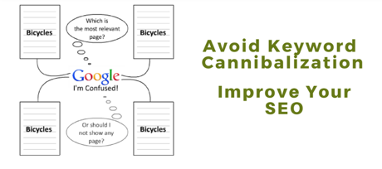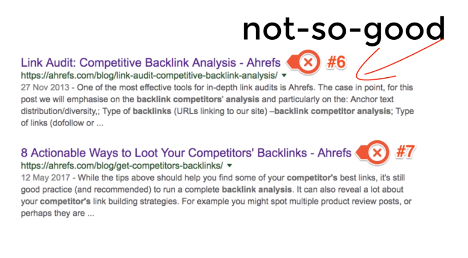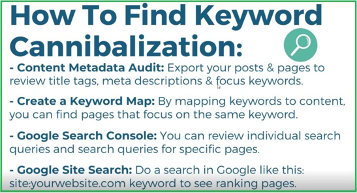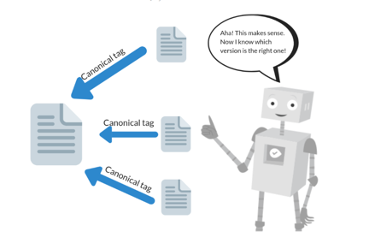

Optimizing your content for similar terms and phrases might make your rankings suffer from keyword cannibalization. You will be reducing your chances of ranking on search engines (Google) as your content will compete with itself.
Continue reading this article to understand more about keyword cannibalism and its importance to content marketing and SEO ranking.
What Is Keyword Cannibalization?
Keyword cannibalization is when a website has more than one content piece that targets the same exact keyword. This is typically done unintentionally, but it takes away the chances of your own rankings, thus the term “cannibalization”.

Image Credits: https://www.spiderseocompany.com/
Keyword cannibalization occurs when different blog posts and articles on a website rank for the same search query in Google; the topic is usually similar or they are optimized for the same key phrases.
Understanding Keyword Cannibalization
Due to the way search engines work, it can’t distinguish which article or piece of content should rank higher for a certain query with significant factors like backlinks and CT hours over several posts. As a result, these links will usually rank lower than expectation.


Image Credits: https://www.webfx.com/
Remember: Google always shows the best results relevant to the user’s search intent based on ranking factors. It makes the most informed choice from your content on which to rank. However, the negative side of that is the ‘icky’ or poor content piece may outrank a great content piece that you’ve written.
Joshua Hardwick, the Head of Content at ahrefs.com and founder of the SEO Project, stated this example to explain Keyword Cannibalization:
If you Google the phrase “competitive backlink analysis” you’ll see two different blogs ranking in positions six and seven. The higher position result is over four years old with just 1000 words and some basic information.
On the other hand, the lower-ranked link has better content with the latest updates and information. However, because the site unknowingly cannibalizes their position because they did the topic twice.

Image Credits: https://ahrefs.com/
Why is Keyword Cannibalization Bad for SEO?
Due to keyword cannibalization, Google will not know which page is more relevant for the specific search query when multiple pages want to rank for the same keyword. Google crawls your website and finds various pages to choose from. A lot of people may think that they will gain technical SEO value, however, this strategy leaves no chance for the site to rank in a higher position. Furthermore, you may also lose various SEO opportunities like:
● Content Quality
When a lot of your content is targeted for the same keyword, it might also be about the same topics. You might unintentionally create duplicate content, again and again, which reduces the quality and lowers your chances of referrals and internal linking.
● Conversion Rate
By focusing on different pages with the same gold, you waste your time and energy and reduce the chances of high conversion rates. Focus your effort on one of these pages instead, so that you can lower the competition and attract traffic to a single page.
● Anchor Text
By targeting your keywords and subject on different pages, you missed the chance of adding the value of internal anchor texts on a single page.
● External Links
External links are an effective ranking factor and can boost a web page’s SEO value targeting a keyword. However, when different page SEO content targets the same keyword, you split external links between those various landing pages. This makes you share external link value among different web pages instead of focusing on just one.
How to Avoid Keyword Cannibalization?
Here are three simple steps you can take to avoid keyword cannibalism:
1. Audit Content and Restructure Website
The first step is to audit your website content. Use different tools to identify your ranking keywords and similar articles based on those keywords. When you identify rankings around the keyword clusters, then you can easily resolve keyword cannibalization.

Image Credits: https://surfsideppc.com/
You can also restructure your website by changing your most authoritative page into a single landing page. Make sure the new landing page serves as the main source of other variations targeted for the main keywords.
For example, if you own a website about “shoes”, it makes sense to make this your canonical source page and link all related content back to it.
2. Merge or Combine Articles
The content audit will reveal which articles or blog posts are similar or target the same keyword. Instead of creating new content, you can combine similar articles and merge them to create one detailed post. By rewriting different articles into one amazing post, you will improve your rankings and solve keyword cannibalization problems.
3. Canonical Tag
A canonical tag aims to tell Google that the URL contains the original or master copy of a web page. This tag is useful because it avoids keyword cannibalization and prevents duplicate content from appearing on multiple links. Thus, it tells Google which website should be ranked in SERPs for a particular keyword.

Image Credits: https://www.orangeseo.net/
A lot of website owners do not know that they are a victim of keyword cannibalization, which affects their website search rankings negatively. Such websites continue to write similar content that focuses on the same keywords. Yes, it is good to write new and fresh content, but it is bad to always focus on the same subject or keyword every time. This is why making a “rel=canonical” tag is needed to help Google identify the authority page.
References
https://www.searchenginejournal.com/on-page-seo/keyword-cannibalization/#close
https://yoast.com/keyword-cannibalization/
https://ahrefs.com/blog/keyword-cannibalization/
https://digitalmarketinginstitute.com/blog/5-ways-to-identify-fix-keyword-cannibalization
https://moz.com/blog/identify-and-tackle-keyword-cannibalisation-in-2019
